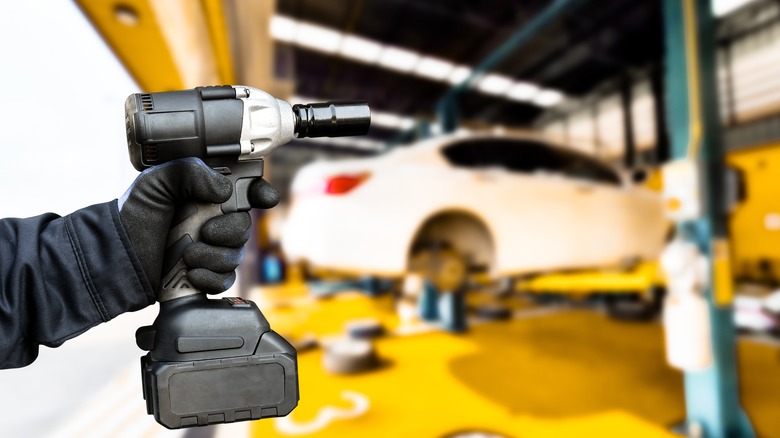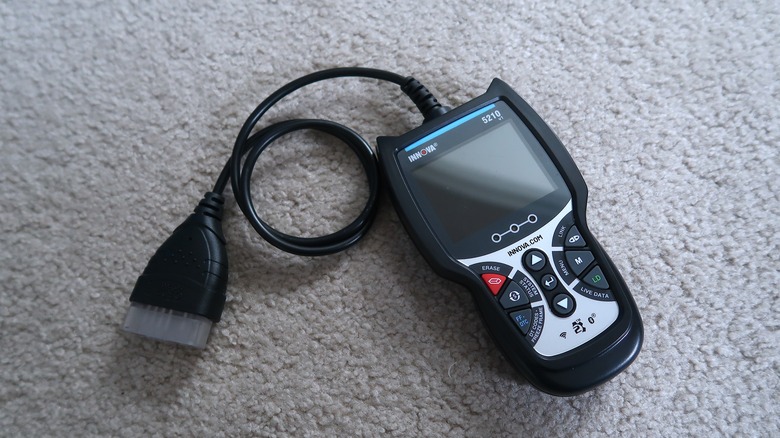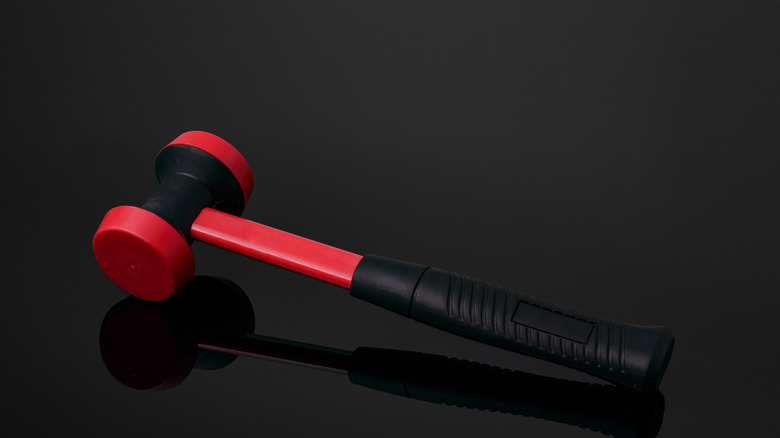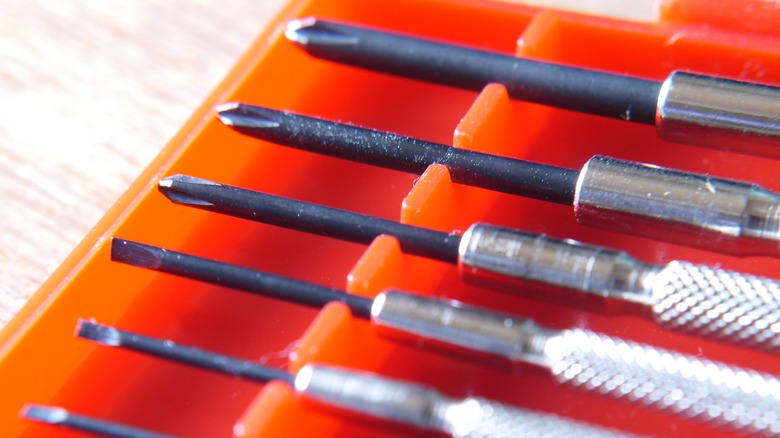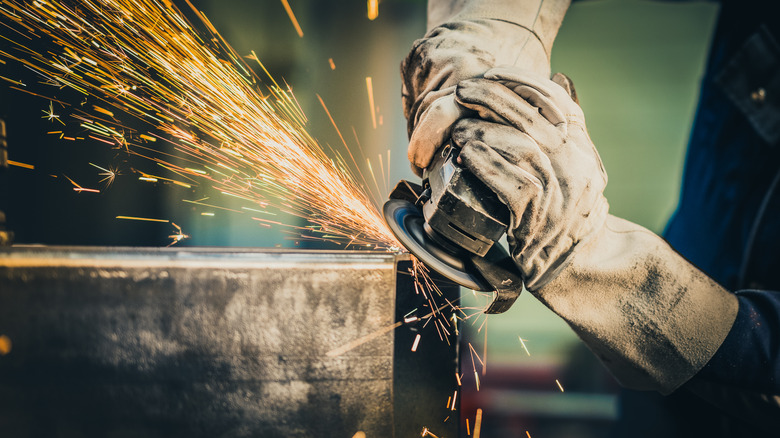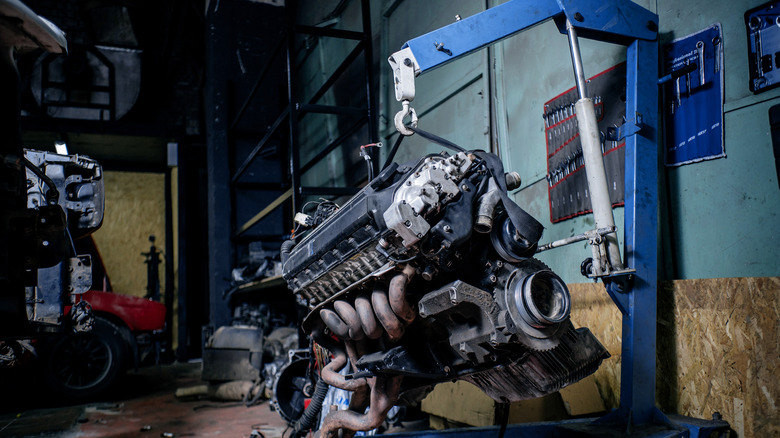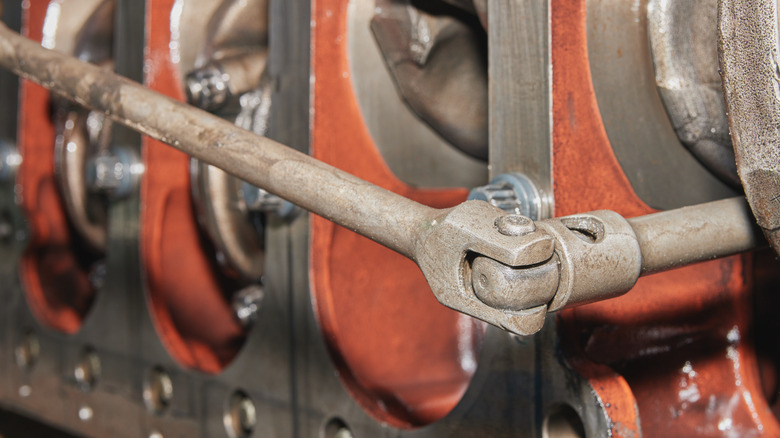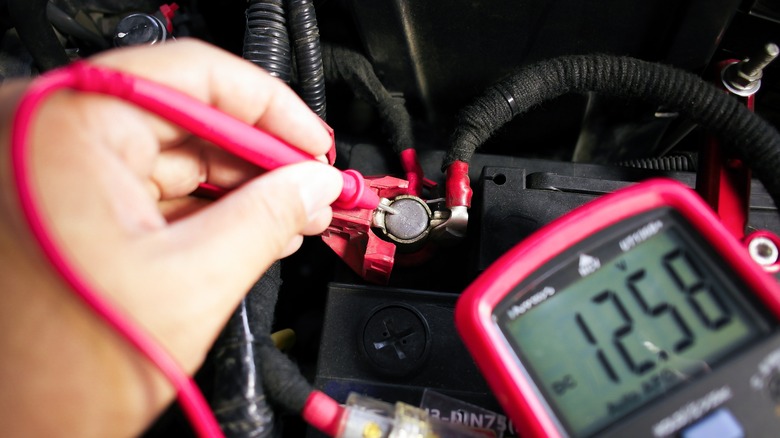10 Specialty Tools Every Home Mechanic Will Wish They Had Sooner
The home mechanic is an industrious problem solver. These individuals are constantly butting up against unique situations that require quick thinking and more than a dollop of innovation. From grappling with the tight squeezes of an engine compartment to an old hand's tool modifications to manage ultra-specific tasks (tool modification can be extremely beneficial, but should only be done by skilled practitioners), plenty of experience and common sense factor into the workshop floor's smooth operation.
Still, even the most seasoned pro can find themselves hard up when missing a crucial piece of gear. Try as you might; without a breaker bar or impact wrench, you'll eventually get caught without any way to loosen a seriously seized bolt. Similarly, diagnostic tools and lighting solutions make all the difference when evaluating a vehicle and looking for solutions to the trouble it may be facing.
Plenty of tools feature prominently in a mechanic's home workspace. Lifting gear and nut turning power are obvious inclusions, but there are many tools that a home mechanic may still be lacking as they set up and expand a shop. Some are precision instruments that only find use under specific circumstances and have, therefore, been left off previous must-have lists. Others might be expensive inclusions and demand a bit of additional savings time.
However, these 10 tools are big on productivity, can make your workflow far smoother, and you'll wish you brought them into your workplace sooner.
An impact wrench
The impact wrench is the bolt-tightening solution that professionals consistently rely on. Hand fastening has its own sense of accomplishment, to be sure, but mechanics will occasionally encounter a nut that just won't budge. For these kinds of problems, a powered fastening solution will almost certainly save time and energy in finishing off the job. Much like a powerful impact driver or combi drill, the impact wrench takes on the familiar form factor, but it fills a very specific workshop need.
Some of the best cordless impact wrenches include the Milwaukee M18 Fuel, high-torque offering, DeWalt's 20V Max 1/2-inch impact wrench, and Ryobi's cost-friendly One+ Brushless 1/2-inch model. These wrenches mix power with reliability (and in the case of Ryobi's wrench, a long-lasting warranty window thrown in on top) for solid breakaway performance and fast tightening. High power is required from time to time, but an impact wrench also delivers rapid bolt work that simply can't be matched when working with hand tools. There's always a place in any mechanic's shop for a ratchet and socket set, but the impact wrench brings a new level of productivity and efficiency into the fold that makes working with cars and other workpieces a joy.
Diagnostic scanner
A simple OBD2 scanner is a piece of automotive equipment that every driver should own. It's a simple tool that can save you tons of money. The cheapest units retail for around $30, while professional-level scanning equipment reaches the hundreds. Harbor Freight's Icon T8 Professional Intelligent Diagnostic Scanner is a great example of a high-end performer in this category. Retailing for $900, the new Harbor Freight find is capable of identifying a wide range of faults and offers up solution options from a library of over four million technical repair approaches.
Any mechanic would be lost without a high-quality diagnostic scanner. The easiest way to identify problem areas in cars you're looking to fix is through the OBD ports (Onboard Diagnostics Dashboard). In all cars manufactured after 1996, the OBD interface is a mandatory inclusion in the American marketplace. This means that nearly any vehicle you might work on that's not considered a collector or classic ride will be immediately scannable for a quick assessment of the issues at play under the hood.
Whether you're opting for a simple scanner that just offers up the fault code or a more professional outfit that can provide solutions alongside a more comprehensive assessment, one of these tools should be high on your priority list.
Dead blow hammer
An essential tool for whacking components into or out of place, a hammer is a must-have for any repair technician, DIY'er, or tradesperson of any sort. However, each unique hammer provides its own specific use case. A framing hammer is the perfect striking tool for driving nails quickly into hefty timbers on a building site while a ball peen unit provides better precision contact and a pinpoint face option. The dead blow hammer is yet another crucial tool, and it's especially useful for home mechanics looking to retain complete control over their workpiece and force application.
A tool like the Carlyle Soft Face Dead Blow Hammer is an underrated find from NAPA Auto Parts. The hammer mitigates the rebound effect that's typical of a metal face—or even in a rubber mallet. What this provides is a hammer that can be used to pound on targeted components or areas without the risk of rebounding the tool into other, sensitive parts within an engine compartment or elsewhere. This tool gives the operator complete control over what is being struck. It forms a crucial, yet often underestimated corner of a mechanic's toolbox.
Precision screwdriver set
Precision screwdrivers are a common sight in any workplace setting. Mechanics rely on these tiny screwdriver heads on a routine basis to work on mall components, particularly involving electrical systems or compact pieces. A versatile set with a solid handle and spin cap like the Klein Tools 32717 set (a 39-bit collection in a compact tool case) is a great option for those who may require a wide range of bit options. An insulated option like Wiha's five-piece precision screwdriver set offers less functional range but far better safety specs when dealing with potentially energized parts.
These screwdrivers might not be commonly seen in a basic toolbox for the renter or homeowner looking to keep up to date on routine fixes. However, this doesn't mean that the small form factor turners aren't worthwhile. Repairing any kind of delicate workpiece or installing tiny screws in a small piece of equipment, furniture, or toy demands the versatile capacity of a precision set of screwdrivers. This addition is so essential that it's often one of those pieces of gear that illuminates other uses. Once you've added a precision set to your workshop, you'll almost certainly find other repairs or maintenance tasks that would benefit immensely from this inclusion.
Angle grinder
The angle grinder is a metal worker's best friend; it's a cutting tool, polisher, rust remover, and shaper all in one complete package. The ergonomics of the angle grinder make it a favorite power tool for many, and it's easy to see why. With such a versatile functionality list (including power sanding and more with specialized attachments that fit into the stem) an angle grinder is one tool that mechanics will often pick up dozens of times per day.
Cutting discs are extremely cheap in most cases. Moreover, DIYers who might have many other projects on their plate can use this tool in double duty for cutting tiles, concrete block, or any metal workpiece that may be needed for roofing, gutters, shed coverings, or patio space. In the automotive area, an angle grinder plays a pivotal role in the preparation phase of rust repair. It's a potent rust remover and metal shaper when paired with a flap disc or wire brush wheel. Cutting small metal components is another forte of the grinder, allowing mechanics to grind down screws or bolts to precise sizes or remove excess material or burrs off the edges of a piece.
The Flex 24V Variable Speed Angle Grinder is a great option for those who want speed control to support polishing and precision shaping functionality, while Harbor Freight's Bauer Corded Grinder will give you immediate baseline performance at rock-bottom pricing. The likes of Milwaukee and DeWalt offer grinders in their high-performance cordless ranges, as well, for those who have already bought into a particular brand's battery platform.
Shop crane
A shop crane might seem like overkill to the outside observer, but the ability to lift and maneuver incredibly heavy components from within the engine compartment is a core function of a mechanic's workshop. A foldable, mobile shop crane is a staple of any versatile workshop, and perhaps surprisingly numerous affordable options exist on the market.
The Pittsburgh 1-Ton Telescoping Gantry Crane is a beast of a lifting system and rolls over and away from an engine bay with ease, even while carrying a full load. The large lifting system costs $850 ($750 for Inside Track Club Members) and is only available in store at Harbor Freight. However, other, more portable solutions can be purchased online. The Pittsburg 2-Ton Foldable Shop Crane is completely collapsible and can be stored easily in a corner of your workspace when it's not needed. The unit is also available from Harbor Freight's online retail store.
Breaker bars
A breaker bar is a tool that often sits for weeks or even months in a casual mechanic's toolbox without being called upon. However, when the need arises, there's simply nothing that matches the brute force of a breaker bar. The longer, the better (in most cases), a breaker bar is an instrument of force brutality. When nothing else will get a nut turning, the breaker bar applies immense force by virtue of its long, heavy arm to untangle the stuck component. These bars are pulled out to start the turn and then returned to their dust-collecting corner of the workshop. Yet, they are one of the most important tools a mechanic will own. This is because no additional work can be completed if a job is ground to a halt by a steadfast bolt. If you can't get a component free from the vehicle, you can't perform the necessary repair work.
Breaker bars offer this impactful power of last resort and are some of the sturdiest and brutish pieces of equipment found in a shed, garage, or workshop. Milwaukee's ½-Inch Drive, 24-inch-long Breaker Bar is a wonderful example of sheer force. The 24-inch arm is more than capable of providing extreme torque when needed. The Crescent ½-Inch Breaker Bar is another 24-inch affair that can perform under the demands of immense pressure. An even longer, 36-inch ICON Breaker Bar adds to the lever power while a 17-inch Pittsburgh Pro in a ⅜-Inch Drive configuration offers ample torque in a bar that can fit into far tighter turning spaces.
Work lighting (especially those with adjustable arms or hooks)
Everyone who works on projects in a home workshop will understand the need for additional lighting. Work lighting helps elongate the hours of the day in which repair works can take place. There's only so much heavy lifting the Sun and standard lighting can provide when trying to tackle precision upgrades or repairs. Similarly, even at high noon, there's no substitute for a perfectly positioned shop light when reaching into the bowels of an engine compartment to install that one tiny piece of equipment or remove a stubborn nut.
Work lighting solutions that include adjustable arms and hooks are particularly valuable. The Braun Rechargeable Magnetic Shop Light and Hercules 20-volt Cordless Stick Light feature hooks that can help position the lamp above your workpiece. The Hercules unit also contorts a bit for increased positional versatility. Going another direction, the ICON LED Rechargeable Magnetic Extendable Underhood Floodlight clamps directly onto the underside of a vehicle's hood to provide a bath of light to the cavity while you work inside the compartment. Also, the EGO Power+ Portable Area Light offers mobile lighting pads to dial in the perfect adjustment for your workpiece and space's needs.
Multimeter
A multimeter is a tool that sits firmly under the radar. A good one can handle a truly dizzying array of electrical testing tasks, and even a basic multimeter sees heavy use in safety testing and voltage checks to ensure proper installation of equipment and wiring. Your multimeter is likely one of the most important pieces of gear in the workshop — and if you don't yet have one, it will quickly take up this vaunted status once you cave and bring one into your workspace.
Even the most rudimentary multimeter can make the distinction between a quality installation or repair, and shoddy work. This is because they can be leveraged to test for continuity, correct polarity, voltage confirmation, and so much more. A premium model like the Klein Tools Digital Multimeter offers AC/DC voltage and current testing, temperature sensing, and resistance while displaying results on a high-visibility LCD display. On the other end of the spectrum, the Gardner Bender Analog Multimeter commands less than half the price while offering a decidedly toned-down user interface. The analog display is a vintage touch, and the five-function unit covers voltage, current, and resistance across twelve range selections.
Either device — among a marketplace of others — will get the job done and allow you to perform electrical maintenance on your car with confidence and simplicity.
Spark plug socket set
Spark plug maintenance is typical of a home mechanic. Older vehicles, in particular, may require an update in this component of the engine system, and a simple change can make a world of difference for newer models facing a sluggish performance, too. However, spark plugs are a finicky piece of gear that doesn't always behave for those who are working without one crucial addition to the workshop. A spark plug socket set like the Quinn ⅜-Inch Drive Spark Plug Socket Set offers all the angular clearance required to reach in under the hood to remove and replace spark plugs without issue or incident.
These sets include extension bars and universal joints for all the wobbly movement you might require to get around tricky engine parts and address the spark plugs directly. There's nothing worse than having to contort your body and limbs in order to reach gingerly into a narrow crevice, only to drop the component you're trying to install! With specifically designed sockets, this trouble becomes a thing of the past, allowing for rapid spark plug changes without any of the hazards that may have characterized the task in the past.

